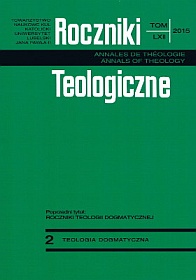The Personalist Shift in Christology
Abstract
The article deals with the issue of the personalistic placement of contemporary Christology. The character of this approach is described by a direct, existential attitude toward the personal phenomenon of Jesus Christ. The analysis in question stems from the reading of the integral and complete humanity of Christ (verus et perfectus Homo) thanks to the use of personalistic language. This take releases the traditional Christology from the burden of concepts that hinder the access to the personal mystery of the Saviour. Thus, the personalistic shiftin Christology means that the “reality” under scrutiny is seen as an irreducible “point” of the existence of the God-Man who sets a radically new horizon of the acquisition of the truth that cannot be reduced to any concepts or formulae. This process is reflected by the principle of co-seemlines that is the modus of the personal covenant of the humanum and divinum that was literally and most fully realised in Christ, thereby giving an unparalleled perspective of speaking of God and of man. The profile of Christology directed existentially (the personalistic Christology) does not lose its scientific and methodological character or conceptual coherence, but it rather broadens the significance of these elements and puts them a radically new interpretative perspective.
References
Balthasar H. U. von, Krisis, in: Spiritus Creator. Skizzen zur Theologie, III, Einsiedeln 1967.
Balthasar H. U. von, Czy Jezus nas zna? Czy my znamy Jezusa?, trans. E. Piotrowski, Kraków 1998.
Bartnik Cz. S., Studies in personalist System, Lublin 2006.
Bartnik Cz. S., Jezus Chrystus jako hermeneuta rzeczywistości, „Roczniki Teologiczne” 55(2008), vol. 2.
Bierdiajew M., O przeznaczeniu człowieka, Kęty 2006.
Gadamer H.G., Prawa i metoda. Zarys hermeneutyki filozoficznej, trans. B. Baran, Warszawa 2007.
Guardini R., Świat i osoba, trans. M. Turowicz, Kraków 1969.
Guardini R., Bóg daleki, Bóg bliski, trans. J. Koźbiał, Poznań 1991.
Guardini R., The Humanity of Christ. Contributions to a Psychology of Jesus, New York 1964.
Milbank J., The Word Made Strange: Theology, Language, Culture, Oxford 1997.
Müller G.L., Katholische Dogmatik. Für Studium und Praxis der Theologie, „Herder”, Freiburg−Basel−Wien 2005, Auflage 6, p. 258.
Rahner K., Teologia a antropologia, „Znak” 21(1969).
Rahner K., Podstawowy wykład wiary, trans. T. Mieszkowski. Warszawa 1987.
Ratzinger J., Znaczenie „osoby” w teologii, „Personalizm” 8(2005).
Ricoeur P., Soi-même comme un autre, Paris, Seuil 1990.
Seewald P., Jezus Chrystus. Biografia, trans. J. Jurczyński, Kraków 2011.
Strzelczyk G., Chrystologiczne miejsce metafizyki, in: Metafizyka i teologia. Debata u podstaw, ed. R. Woźniak, Kraków 2008.
Wierciński A., The Hermeneutic Retrieval of a Theological Insight: Verbum Interius, in: Between the Human and the Divine. Philosophical and Theological Hermeneutics, ed. A. Wierciński, Toronto 2002, p. 1-23.
Zilles U., Pluralizm w teologii, in: Podstawy wiary – teologia, Kolekcja “Communio” 6(1991).
Życiński J., Teologia o ludzkim obliczu. Przedmowa, in: J. Szymik, Teologia. Rozmowa o Bogu i o człowieku, Lublin 2008, p. 5.
Copyright (c) 2015 Roczniki Teologiczne

This work is licensed under a Creative Commons Attribution-NonCommercial-NoDerivatives 4.0 International License.





